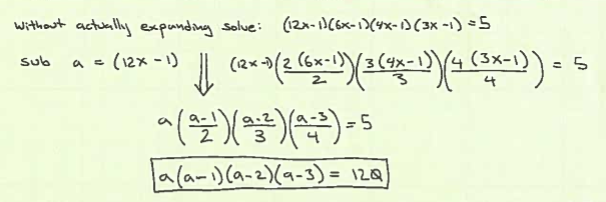This problem kind of bugs me. Here is the problem and my first step:

So I like my first step – but then my way of solving {a(a-1)(a-2)(a-3) = 120} is wonky. I want to expand it and use the quadratic equation – which is not slick enough to be what they are after. I am not seeing synthetic division, or any usual suspects – so I think I am missing something obvious.
Rick, someone I work with, looked at the problem and immediately said you could tell that the solution needed to be divisible by 5, which happens to be a valid solution here. However I don’t believe that is always the case though.
My way to get the solution shows a solution of {-2,5}. Work shown here.